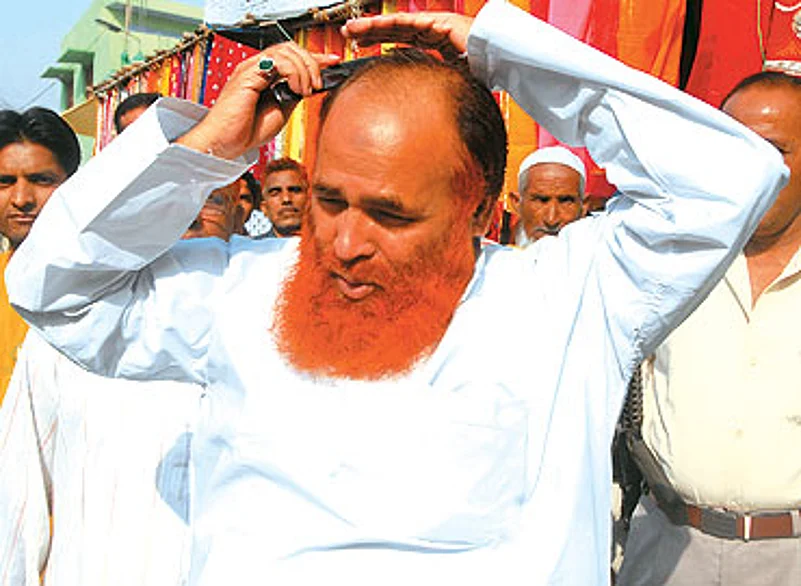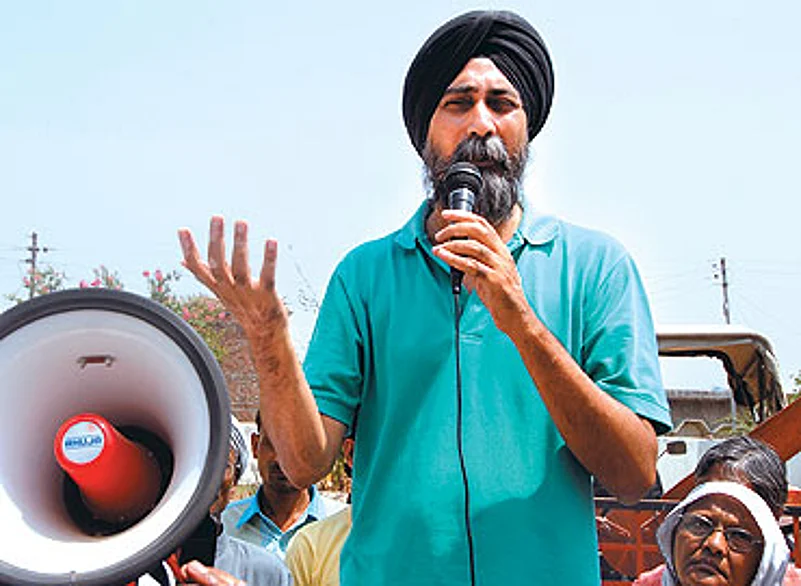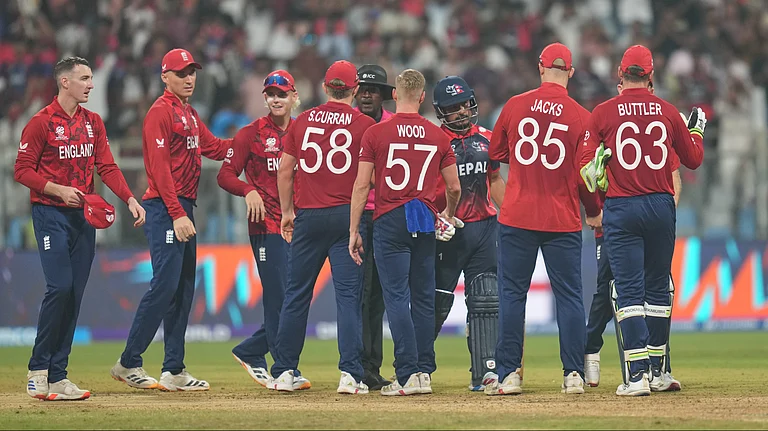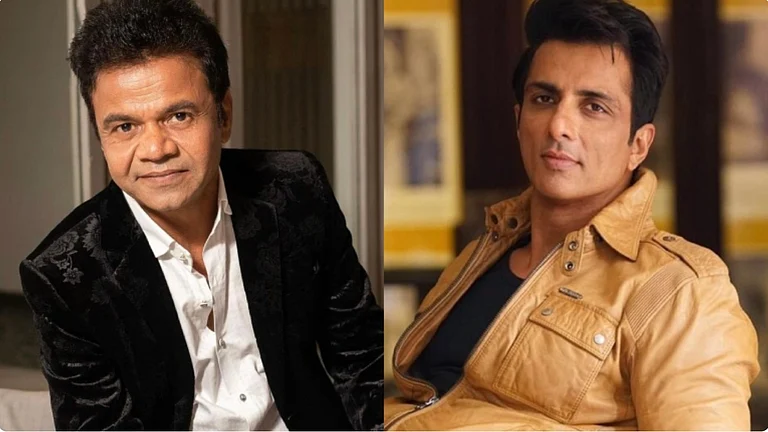So, how good are you at attacking Muslims without actually naming them? If the Vishwa Hindu Parishad announces a Saffron Idol contest, this is what the elimination round will be about. Before us, in village Kanakor, is a middle-aged speaker who would sail through that round with ease. There are two kinds of voters, he tells the large crowd assembled here for over an hour in the merciless afternoon heat—"rashtrabhakts" and "rashtradrohis", nationalists and traitors. "Rashtradrohi vote zaroor denge, apne leader ke ek ishare par vote denge (The traitors will always vote, and on the orders of their leaders)," he thunders, his voice amplified by a mike. "And their women will stand in long queues, with their children around them," he continues, with sarcastic mock admiration. "It will be hot and slushy, policemen will push them around, but they won't budge—not until they cast their votes." Then, chiding the "rashtrabhakts" in a big-brotherly way for being lazy, Ram Saran Varma, a BJP ex-minister, finishes off with a sinister compliment: "Rashtradrohi se matdaan ki kala seekhni hogi (We will have to learn the art of voting from the traitors)."
When it comes to the dark arts of Hindu vote consolidation, though, men like him, prepping the crowds before Varun Gandhi's meetings in Pilibhit, do not need lessons. They stand on stages draped in saffron and flirt dangerously with the election code—more dangerously than Varun, with the spotlight trained on him, clearly wants to right now. By the time the large young man arrives in a jeep kicking up dust, the Jai Shri Rams are rolling easily off tongues, the kamal ka phools are being obscured by dancing triangular VHP flags, the tough-looking fellows in T-shirts, snazzy dark glasses and saffron scarves who were earlier zipping around on motorbikes, are milling around in an orchestrated frenzy. Party workers twice Varun's age are getting ready to touch his feet, and the audience is waiting to listen to him.
Frankly, as speakers go, he isn't quite Saffron Idol. This is not the bravura performance of a Vajpayee or even the compellingly poisonous discourse of a Sadhvi Rithambara; it is an ambitious youth trying out oratory, with some coaching, in a language for which he has no feeling. He starts out with a flurry of drawn-out greetings in laboured Sanskritised Hindi (paramadarniya matgan, paramadarniya netagan...), but descends rather quickly into violent imagery ("Yeh sarkar mujhe phansi laga deti", "meri gardan kat jaye, mein aap ki gardan jhukne nahin dunga", "goli khaane ko tayyar hoon"). There's a lot of "izzat" and "atmasamman" and "rashtrabhakti" tossed around, along with a few clumsy compliments for Pilibhit, and the mandatory references to the 20 days (though you would think it was 20 years) in Etah jail, but it's all rather empty. As Narendra Modi could have easily demonstrated, there are more scintillating ways of reaping the benefits of notoriety without risking a lauki-eating stint in jail.
But in the end, it doesn't matter. The saffron family has plenty of paan shop propagandists to supply rhetorical fluency. What Varun supplies is the idea of Varun: fair, strapping, pedigreed, headline-making, helicopter-riding Varun; young, purposeful, 'Hindu-minded' Varun, vengefully punished by Behenji. (Even those who don't endorse the viciously anti-Muslim speeches he made in March to attract Hindu votes think she overdid it.) While being a Gandhi will probably hamper Varun in his ascent up the BJP ladder, it's not so in Pilibhit. Retorts Prakash Kashyap, a farmer travelling on a village road in a crowded rickshaw, when I quiz him about Varun's inexperience: "Think of the sacrifices his dadi, uncle, father have made for this country. " And then, whether it's a college student fighting mofussil boredom or a labourer fighting desperate poverty, there is that poignant flicker of hope you always encounter in the so-called VIP constituencies—in the alleged life-transforming abilities of "hi-fi" candidates.
What Varun needs to do to keep these strands together until May 13 (voting day here) is to look glamourous, dynamic, hyper-nationalistic and deferential, all at the same time. So far, he appears to be doing nicely. At one meeting after another, as the 29-year-old soaks up chants of "bhavi saansad" and "bhavi mukhyamantri" (future MP, future CM) his face also swivels around the stage, looking for workers he can identify, and praise. Though clearly wary of the media, he could teach mummy Maneka a lesson in calculated cordiality ("I am sorry, ma'am," he says, "I'm not giving any interviews these days." And then, with a smile: "I saw you at Aonla.") Local VHP chief Deepak Agarwal is acutely aware of the comparison. Maneka, the sitting MP, always kept him at arm's length, he confesses; Varun, whom he trekked to Etah jail to visit, is a delight.
It's not hard to see why he thinks so. Pilibhit is a deceptively placid place, where you run into Hindus and Muslims sharing a rickshaw or sitting in the same teashop. But in a constituency where the Muslim vote is substantial—about three-and-a-half lakhs—and the Hindu vote over twice as much, Varun's nastiness seems to be driving the desired wedge. In a teashop in Jehanabad kasba, a multi-caste group of Hindus, among them Brahmins, banias and kurmis, make no secret of being unabashed Varun fans. The lone Muslim shopkeeper sipping his tea stays silent, clearly not wanting to start a fight. A kilometre or so away, at a mela adjoining a dargah, Muslims are not silent. "Varun dushman hai," says kabab-seller Mohammed Sharif sullenly. His customers all agree.

SP's Riyaz Ahmed
Varun's rivals come in vivid hues, from his peacock blue T-shirt-sporting maternal uncle, the Congress's V.M. Singh, who steps out for campaigning as if dressed for a game of golf, to the flaming mehndi-orange bearded Samajwadi Party (SP) candidate Haji Riyaz Ahmed, who hastily combs his beard for a photo-session with Outlook. As for the BSP's Ganga Charan Rajput, his reputation is painted, even by his supporters, in the rainbow colours of a turncoat. ("He has been in every party except the BJP," says his brother artlessly.) Landowning Singh, the richest candidate of Elections '09, has been slugging it out in the electoral maidans of Pilibhit, which he entered as Maneka's honorary secretary, for over two decades, losing more elections than he has won. But many here speak warmly of his hard work on local issues, especially on securing fair sugarcane prices through the courts.

V.M. Singh
Is it the air of distressed gentility about Singh's campaign—the jeeps packed with ageing uncle-jis and aunty-jis from the glory days of the Congress and not a big leader in sight—that leads Haji Akbar Hussain to wonder whether he can fight the good fight on behalf of Muslims? The Haji, who operates a dharamkanta (weighbridge) in the kasba of Baheri, is putting his money on the SP's Riyaz, another bolted colt from Maneka's stable (whom the Congress, notwithstanding its gentility, calls a Maneka plant, installed to fragment Muslim votes). Others cite Mayawati, who has been wheeling out maulanas here to certify her as the true protector of Muslim rights. It does seem, in places, that Muslim votes will coalesce around feisty Riyaz, a local-boy-made-MLA who is busy denouncing his rivals as "Siberian cranes". But at others, it seemed that they would be fragmented. If that happens, it's a bonus for Varun.
Will the breeze from Pilibhit blow to Aonla, a constituency composed of the dull backwaters of two western UP districts, Bareilly and Badaun? Sitting MP Sarvraj Singh, who won from here in 2004 on a JD(U) ticket, but is now with the BSP, and Dharmendra Kashyap of the SP, are both manifestly in the fight, each pitching himself as a sincere son-of-the-soil with solid caste backing against Maneka's Delhi glamour. And each, of course, claims to be the true defender of Muslims, whose vote is critical for either of their victories. A trip to several interior villages suggested significant name recognition for Maneka, who has been making the rounds here for the past couple of years; and yes, that flickering hope again, that a VIP, despite her poor record in Pilibhit, can actually transform lives. She knows that and harps about development from every platform, in her characteristic headgirlish style. On the other hand, there is nothing quite rivalling the Varun awareness working across castes in Pilibhit. But the "other Gandhis" aren't leaving any stone unturned either to carve out their own little mother-and-son enclave, albeit one separated by the city of Bareilly. Some months ago, when Maneka introduced Varun to her new constituency, it was as her son. Now she's "Varun ki maa", standing on stage, waiting for the saffron helicopter to arrive.


























